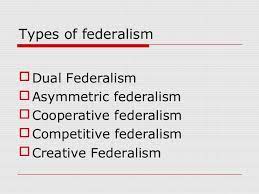Ahmedabad
(Head Office)Address : 506, 3rd EYE THREE (III), Opp. Induben Khakhrawala, Girish Cold Drink Cross Road, CG Road, Navrangpura, Ahmedabad, 380009.
Mobile : 8469231587 / 9586028957
Telephone : 079-40098991
E-mail: dics.upsc@gmail.com

Asymmetric Federalism
News: The recent SC verdict on abrogation of Art 370 (Special provision with respect to J&K) has highlighted the nature of asymmetric federalism existing in India.
What is Asymmetric Federalism in India?
• Asymmetric federalism in India refers to the unequal powers and relationships in political, administrative, and fiscal arrangements between the federal units constituting a federation. This asymmetry can be viewed in both vertical (between the centre and states) and horizontal (among the states) senses.
Types of Asymmetric Federalism in India
| Vertical Asymmetry | Horizontal Asymmetry | Fiscal Asymmetry |
| Article 3 - The Centre can unilaterally alter the state names and boundaries. | Art 371-371J- Special position, powers, and protection enjoyed by some states. | Centrally sponsored schemes (CSS)- For special category status states, the Centre pays 90% of the funds required in a CSS, as against 60% in the case of normal category states. |
| Article 352 & 356- Provisions related to imposition of National Emergency and President’s rule. | Schedule 5- The administration and control of tribal areas in 10 states | Horizontal devolution among states based on achieving certain criteria such as Income distance, demographic performance etc. |
| Governor – Appointed by Central government and is a representative of Centre. | Schedule 6- The administration of tribal areas in Assam, Meghalaya, Tripura, and Mizoram. |
What is the significance of Asymmetric Federalism in India?
• Plurality of Indian society: India has a diverse and pluralistic society with multiple religions and languages, and asymmetrical federalism is a necessary framework for a multicultural and multinational country such as India.
• Protection of minorities: By giving more power and autonomy to regions where certain minority groups are concentrated, asymmetrical federalism helps ensure that these groups are not marginalized.
• State-specific issues: By giving more power to states, asymmetrical federalism can help ensure that the state-specific issues are given the attention and resources they need to be effectively addressed.
• Accommodation and integration: Asymmetrical federalism is a system that allows for self-rule within the framework of shared rule, and it follows the principle of weighted and differentiated equality.
• Strengthening federalism: Asymmetric federalism strengthens federalism by ensuring a balance of power by ensuring decentralization of power and decision-making as per requirements of the federal units.
What are the challenges with the Asymmetric Federalism in India?
• It has a tendency to promote regionalism and separatism.
• It creates imbalances in decision making and resource allocation often leading to perception of favoritism and discrimination. For example, as seen in case of erstwhile J&K state where development of Ladakh was ignored.
• Some regions benefit from preferential funding or fiscal arrangements, while others may receive fewer resources, resulting in economic disparities and regional imbalances.
• Political principles and factors are taken into consideration while implementing these principles which comes at the cost of required development and public interests.
Conclusion
• The Indian constitution is blend of rigidity and flexibility but emphasizes on a strong center visa-vis states. There should be right balance between Symmetric, cooperative and asymmetric principles of Federalism that promotes Good Governance and serves interests of every section of the society.

Address : 506, 3rd EYE THREE (III), Opp. Induben Khakhrawala, Girish Cold Drink Cross Road, CG Road, Navrangpura, Ahmedabad, 380009.
Mobile : 8469231587 / 9586028957
Telephone : 079-40098991
E-mail: dics.upsc@gmail.com
Address: A-306, The Landmark, Urjanagar-1, Opp. Spicy Street, Kudasan – Por Road, Kudasan, Gandhinagar – 382421
Mobile : 9723832444 / 9723932444
E-mail: dics.gnagar@gmail.com
Address: 2nd Floor, 9 Shivali Society, L&T Circle, opp. Ratri Bazar, Karelibaugh, Vadodara, 390018
Mobile : 9725692037 / 9725692054
E-mail: dics.vadodara@gmail.com
Address: 403, Raj Victoria, Opp. Pal Walkway, Near Galaxy Circle, Pal, Surat-394510
Mobile : 8401031583 / 8401031587
E-mail: dics.surat@gmail.com
Address: 303,305 K 158 Complex Above Magson, Sindhubhavan Road Ahmedabad-380059
Mobile : 9974751177 / 8469231587
E-mail: dicssbr@gmail.com
Address: 57/17, 2nd Floor, Old Rajinder Nagar Market, Bada Bazaar Marg, Delhi-60
Mobile : 9104830862 / 9104830865
E-mail: dics.newdelhi@gmail.com